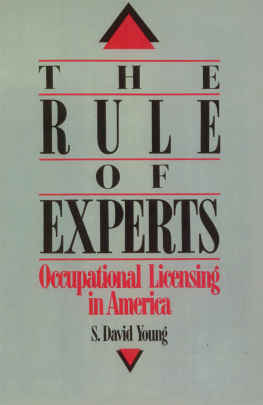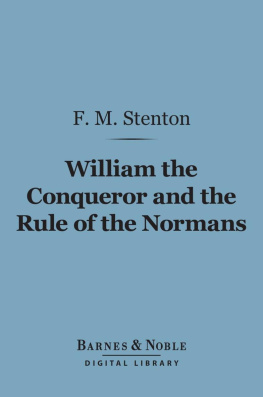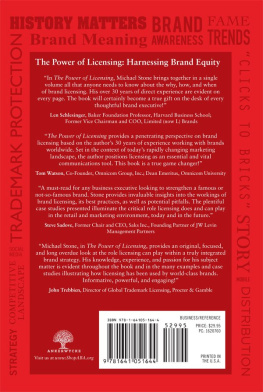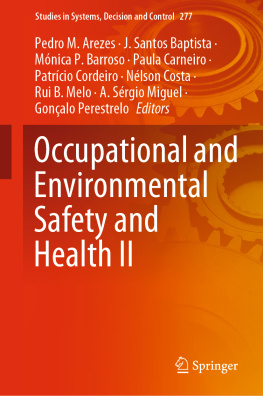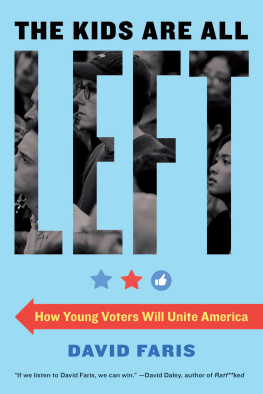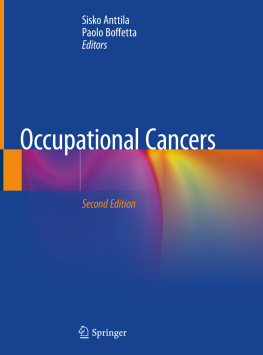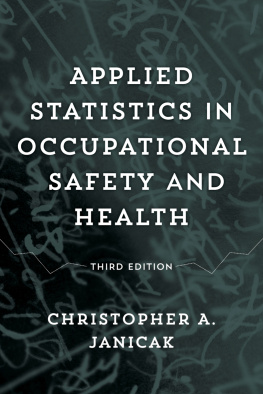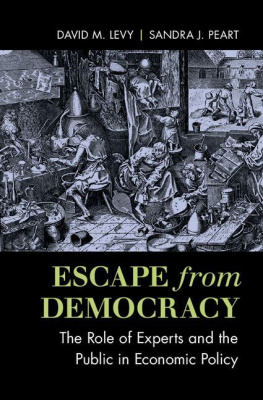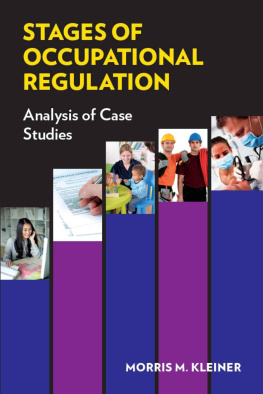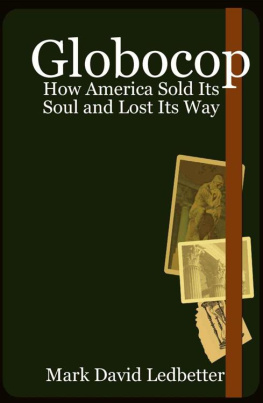THE
RULE
OF
EXPERTS
THE
RULE
OF
EXPERTS
Occupational Licensing
in America
S. David Young
INSTITUTE
Copyright 1987 by the Cato Institute.
All rights reserved.
Library of Congress Cataloging-in-Publication Data
Young, S. David, 1955-
The rule of experts.
Bibliography: p. 95
1. United StatesOccupationsLicenses.
I. Title.
HD3630.U7Y68 1987 351.82'43046 87-536
ISBN 0-932790-61-5
ISBN 0-932790-62-3 (pbk.)
Printed in the United States of America.
C ATO I NSTITUTE
1000 Massachusetts Ave., N.W.
Washington, D.C. 20001
To Marvin Young
Foreword
This is an important book. It addresses fundamental questions regarding economic freedoms. Under the pretext of ensuring quality control, occupational licensing in America restricts competition and choices for the ordinary consumer. It is a form of domestic protectionism, which, like all protectionism, ultimately harms the consumer. Higher prices, fewer choices, and less innovation prevail; economic freedoms are diminished.
It is not enough, however, simply to proclaim those truths, and David Young goes to great lengths to marshal empirical data that support such conclusions. Under occupational licensing, the heaviest burden falls on the poor. All of us are denied choices and opportunities, but the poor are especially burdened with higher costs and often must do without a particular service or commodity.
In my position as chairman of the board of the Legal Services Corporation, I see most acutely the impact of the lawyers' cartel on the poor. Along with the middle class, they are denied effective, low-cost dispute resolution services and legal assistance in part because of the laws protecting the legal profession. Occupational licensing permits that cartel to exist.
The legal monopoly rests on two major pillars. The first is the laws that set aside specific work exclusively for lawyers: the unauthorized practice of law (UPL) statutes. The second is the rules on how one may become a lawyer and what one may do after one becomes licensed. Like all such restrictions, they are really barriers to competition, not ensurers of competence, as Young's book, which touches on all the professions, explains.
Recently I went before the American Bar Association's Board of Governors to talk about these problems. I laid out in some detail the laws and rules that will need to be changed if our profession is serious about prOviding access to justice for all. Shortly after the conclusion of my remarks the president of the ABA called for my resignation, not for reform.
That reaction typifies what such organizations do to those who challenge them. Throughout the nation men and women who technically are not lawyers are trying to deliver legal services. The organized bar is trying to shut them down. In most cases it is not the clients that complainthey are well satisfiedbut the bar, which does not want the competition.
Change ultimately comes about because of the power of ideasthe power of a shared vision. A proper understanding of David Young's work reveals a vision that would unleash the tremendous energies of a free and creative people and bring about an open and competitive system for the provision of services and commodities. The fruits of such a system would be lower costs and more opportunities for all. The Cato Institute deserves much credit for making Young's research available to the general public. As F. A. Hayek noted long ago, our political freedoms are very much connected to our economic freedoms. The loss of either leads to the loss of the other. Let the reforms beginnow.
W. C LARK D URANT III
Chairman of the Board
Legal Services Corporation
Acknowledgments
This book grew out of my doctoral research at the Colgate Darden Graduate School of Business Administration, University of Virginia. I am grateful to the members of my dissertation committeeKen Middaugh, Whit Broome, and Mark Reislerfor their patience and guidance throughout the development of the project.
Others who provided helpful comments or advice on earlier drafts include Ken Elzinga of the University of Virginia, Benjamin Shimberg of the Educational Testing Service, and David Boaz of the Cato Institute.
Finally, I thank Bette Collins of the Darden School for her outstanding editing assistance.
I. Introduction
Any searching examination of privilege is unwekome. Privileged groups are naturally aggrieved; from their point of view, privilege, once gained, is best forgotten. But, more generally, any critique of the professions must sound captious or ill-mannered. The professions operate in an atmosphere of almost sacerdotal reverence: the stillness of the courtroom, the antiquity of the solicitor's office, the embarrassed silence of the doctor's surgery. How unseemly to apply economic analysis to all that! But there are good reasons ... even if it means stepping on corns that are sometimes ancient and always tender.
D. S. Lees
Forming voluntary associations is a fundamental right in free societies. Physicians, attorneys, and other professionals are among those who have formed such associations in modem industrial countries. These professional associations have, quite properly, wide discretion over entry, expulsion, and the formulation of rules governing the conduct of their members. The major problem with this arrangement is the tendency for professional groups to impose these rules through state-enforced licensing laws. This particular form of government regulationa pervasive characteristic of occupational groups in the United Statesis the subject of this study.
A careful analysis of the effects of licensing across a broad range of occupations reveals some striking, and strikingly negative, similarities. Occupational regulation has served to limit consumer choice, raise consumer costs, increase practitioner income, limit practitioner mobility, deprive the poor of adequate services, and restrict job opportunities for minoritiesall without a demonstrated improvement in quality or safety of the licensed activities. The evidence with respect to medicine, law, dentistry, and other highly visible professions is consistent with these findings. Indeed, some of the most blatant and indefensible abuses of licensure have been committed by the most revered professions.
This study analyzes the economic, ethical, and political dimensions of licensure and reveals that, contrary to the assertions of professional groups, the public welfare is rarely advanced these laws.
Professionalism in America
Professional associations are largely a product of the extraordinary scientific, technological, and legal advances that have taken place since the Industrial Revolution. They reflect the demands of various groups in society for the existence of standards in an increasing variety of highly specialized services. Indeed, a modem nation without professions is impossible to imagine. By establishing minimal standards for, among other things, its members' education and training, professional associations. help to promote the specialized skills that are highly valued by businessmen, consumers, and government agencies.
Professionalism in the United States generally refers to the provision of expert, high-quality service to consumers. Underlying this definition of professionalism is the assumption that professionals are granted the privilege of self-regulation in exchange for providing services at a fair price. Professions are granted autonomy from direct public control but are expected to give precedence to client interests over personal profit when conflict arises. In other words, professionals are charged with serving the public interest.


